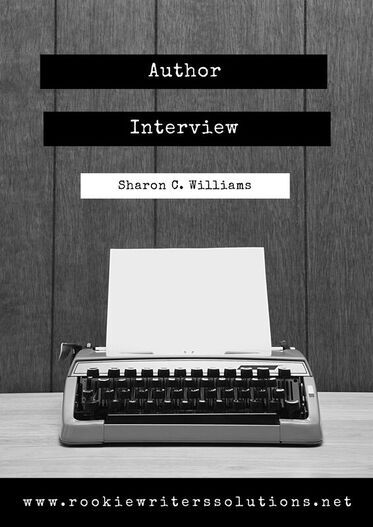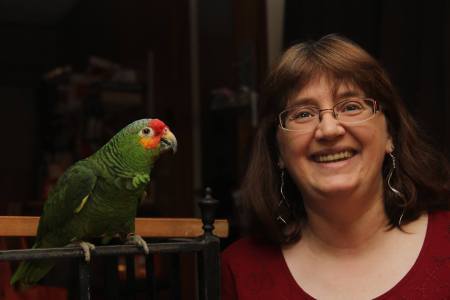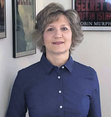RWS Interviews Sharon C. Williams
 Name or pseudonym: Sharon C. Williams
Name or pseudonym: Sharon C. WilliamsWhat genre/s do you write in, and why? I write in comedy, short stories, children, and drama.
I learned early to write on what I know. Well, that is what I had read from books and told from other authors.
Some of my novels come from observations around my home. Since I knew the specific topics they pertained to, it seemed like a place to begin.
Drama is a genre I wanted to try. I no longer feel I should stick to what I know and I’m excited to try out new genres in hopes of challenging me.
When did you begin writing, and was it something you’ve always wanted to do? As an avid reader, I always considered authors magical people I would place high up. I was in awe at how they transformed words into chapters and into a story and weave it perfectly.
I came to writing in my early 40ties. It was something that kind of fell into my lap. I never thought of writing before.
My husband had told a friend of mine earlier that he felt I wrote well. Upon her telling me this, I thought to myself, ÒWhy not?Ó I started seriously writing in the Fall of 2009. I had a story in my head that would not let me rest. Having two surgeries at the end of 2009, non-related, gave me a lot of free time to put to paper the story.
What type of research goes into your writing? My children’s series is in the Amazon rainforest, to which I knew next to little.
Wanting the books to be educational and enjoyable, I researched the rainforest for months for the trees, animals, and plants. I have gone through at least half a dozen links to get the information right. I check links, books, and videos.
I want kids to learn, and by learning, maybe get engaged in the plight of the rainforest. I do this for the various genres I write. I want to be as accurate as I can.
I will also read books by authors who write in the genres I am writing in, especially if it is a new genre. I want to see how they go about the different aspects of that particular genre.
I have watched a variety of webinars to learn in any way to progress my writing.
How do you develop your characters, plot, and setting? For my children’s series, I have an advantage. It is about my rescued Amazon parrot, Jasper, who came to his forever home in 1999. He was five. After observing Jasper for about a decade, I created a character based on him.
My book, Squirrel Mafia, is about my war with the squirrels in my backyard. It is a comedy. But once again, after observing squirrels for years, I input them into a book.
In other manuscripts where I can not pull from observations, I will create characters from experience in my life. I will write up a complete bio of each character. I will include physical, mental, emotional, and spiritual aspects.
The setting sometimes comes from the character and the synopsis of the work.
For example, the pitch for my WIP, "Lost Faith," is, "A place in time where religion isn’t allowed." Once I chose the time frame that worked, researching began.
What is your creative process (i.e. inspiration, where do you write)? I always have pen and paper with me. You know, in case something comes up that I feel I can use for a present WIP or something I could use for later.
The inspiration for my children’s series is my parrot, Jasper. By observing him. Over the years, his personality that you would read in the series is moments I have seen him do.
My comedy series, Squirrel Mafia, is based on my war with the squirrels in my backyard, and they are my inspiration.
I write all over. I have written outside in my back yard, on my couch, in my office, and more. I like that aspect of being a writer.
I always write my first draft by hand. It is a witch to type up, but it suits me to do it this way. You will see my feet curled under me, hunched over a notebook as I write.
Have you ever dealt with writer’s block? If so, how do you find your creative flow again? When I tell people I have not, I tend to get a "Yeah, right," look. But it is accurate to a degree. I tend to work on more than one WIP at a time. If it takes me longer to work out a scene or dialogue, I will revert to another WIP or another part of the story.
While some can call this writer’s block, I smudge the line in thinking it isn’t.
Are you self-published or traditionally published? I am both.
Can you give us your experience in either or both of these types of publishing? With my traditional publishers, I have had to be willing to compromise. I have had to be on a different timeline when my books would be released. With various marketing tools, one avenue is offering your books at a discount or free for a length of time or permanently. That was a hard one to wrap my mind around. We all know how long it takes to get our book complete. It was not in my thinking to have it free.
They did have their in-house graphic artist and editor that was part of the contract, so that was less to worry about, and they handled the files placed on the various sites.
They do have a marketing department. Granted, I still have to do some on my own, but between the two of us, I am being noticed in way more places than on my own. They have the contacts I don’t.
The projects I self-published required me to do all of the work. I had to find my editor, graphic artists, and someone to help me learn how to upload or format the book. Some of this costs money that I did not readily have. The quality I could afford might not be of good quality. Also, marketing takes a lot of time away from your writing.
But with these projects, I was not in a contract, unlike with the traditional publisher, so I had total control of how I wanted it done, regardless of whether it came out great or not. I also get paid quicker and paid more.
I have enjoyed experiences in both. By doing so, I have been able to see behind the scenes. It’s given me a better understanding of the industry. With self-publishing becoming more and more popular, I think it is a good idea to cover both bases for your brand.
Do you market your own books? If so, how easy or difficult is this for an author? I do, but I do get help from my publisher. Marketing is very time-consuming. One has to find the platforms that work for them. It is constantly changing. What works one month may not work three to four months down the road.
One has to always keep on top of the revolving table of social media and marketing. Is it easy or hard? That depends on what you are trying to accomplish. What I do know is it takes time. You are working on your brand and yourself over time to get the most exposure possible. It is never-ending.
What advice would you give other writers/authors about receiving negative reviews? Receiving a negative review is hard. Also, we might want to respond to the critic. But we need to be careful. You are representing your book, brand, and yourself.
It bothers me when one puts so much time and effort into creating a book only to have someone trash it. Sometimes, you will find people write horrible things about your book even when they have not read it.
But I don’t respond. Getting into a match with someone doesn’t do you any favors.
What advice would you give to wanna-be writers who are trying to get a book published? Join a writer’s group. If you go on your own, write your book, edit yourself, and think you are ready to publish, I would politely disagree.
Your book needs to be in the best shape possible. You will miss things that others might not. The more eyes you get on your manuscript, the better before you start submitting it to publishers.
Also, make some goals for your book. Do you want to self-publish or go the traditional route? Are you ready to promote yourself? Publishers now, from my experience, are asking how much I am willing to market myself and what kind of social platform I have. You will need a social platform. If you don’t, who would you shout out to that your books are out there apart from friends and family?
If you had a chance to meet one of your favorite authors, alive or dead, who would it be? And what questions would you ask? Stephen King and R.L. Stine, without a doubt.
As a children’s writer and a fan of R.L.Stine, I would ask questions such as where do you get your ideas? How do you go about setting up your scenes and dialogue? Plus, as a children’s author, any advice from a master would be so helpful.
For Stephen King, I would ask where does he get his inspiration. I have a couple of WIPs with drama and mystery as the genres. I would ask how he would set those up.
List your book links and where we can find them to purchase:
The books I have out at the moment are:
Jasper, Amazon Parrot: A Rainforest Adventure
Jasper, Amazon Parrot: Rainforest Friends And Family
Jasper, Amazon Parrot: The Perils of The Jungle
Squirrel Mafia Vol 1
Everyday Musings
Walmart - Jasper, Amazon Parrot Series
Amazon; ITunes; Smashwords; Barnes & Noble [image error]

Published on January 31, 2022 04:30
No comments have been added yet.



